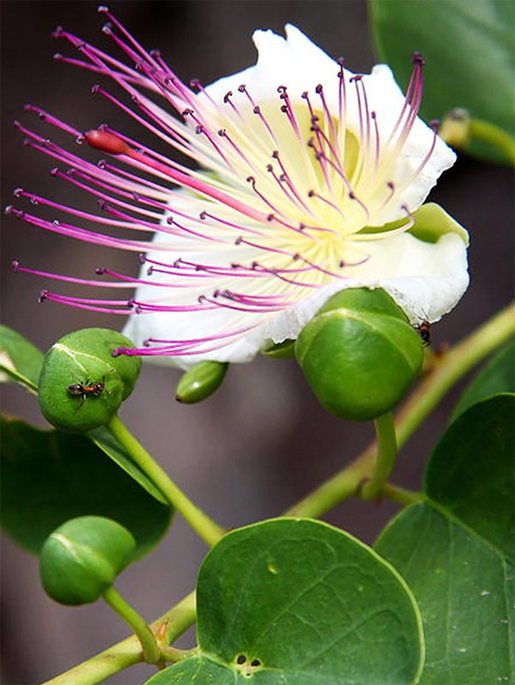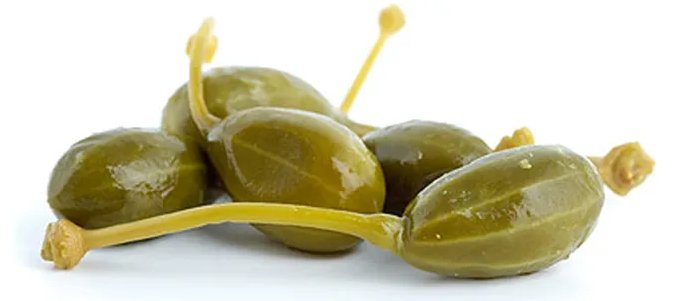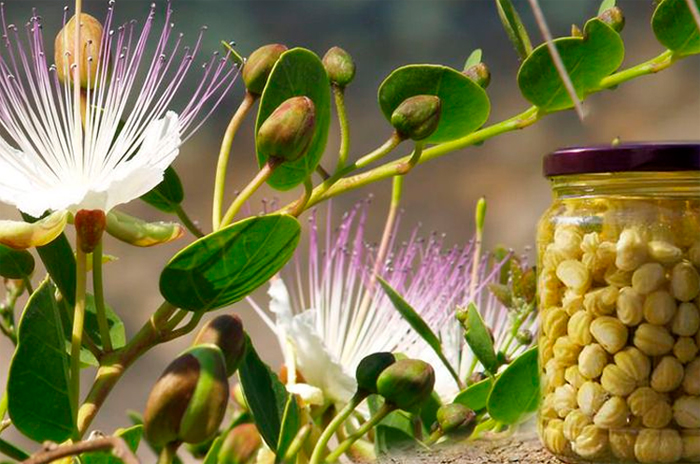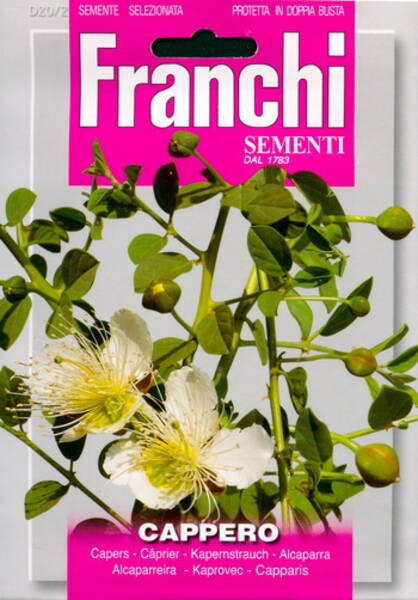Perennial ornamental herb. It is a great plant suitable for growing on balconies, terraces and winter gardens. Bitter spicy berries - buds are used for food flavouring. Berries are salted, pickled and used to spice up gourmet dishes, salads, pizza, meat and fish dishes.
The plant is a bush, flowers are very ornamental and bloom all summer. After blooming, flowers begin to develop berries. The plants are hardy and grow well in poor soils, very undemanding to water. In the northern part of Europe, we recommend to growing these plants in pots and moving them indoors in winter, when the temperature is not lower than -5°C.

Capers are propagated by seeds.
In Estonian conditions, capers do not hibernate, so they can only be used as tub plants. Placed in a sunny position, as ampelous plants, they need only very moderate watering.
* Young shoots, flower buds and young fruits are used as food.
It is very important to collect the buds in time - before they reach large sizes and begin to bloom. The most valuable buds are small, round and hard. Capers are washed, dried in the sun, and then placed in jars and preserved in salt, marinade or salt dissolved in vegetable oil. Due to this, they acquire a sour-salty, slightly spicy taste. They go well with cold appetizers, hodgepodges and courses of meat and fish. Often they are added to a variety of sauces, including mayonnaise.
The fruits can be eaten fresh as they are rich in sugar (up to 12%). Previously, they were dried and used in winter instead of sugar.
Capers are a low-calorie and dietary product containing 14 kcal per 100 g of fresh product (the calorie content of canned capers is 23 kcal per 100 g of product).
Nutritional value of capers in 100 grams: Proteins - 0.8 g, Fats 0.1 g, Carbohydrates 2.5 g, Ash 0.1 g, Water 85 g, Calorie content 14 kcal.

Useful properties of capers.
Capers contain the alkaloid capparidine. In fruits up to 12% sugars, up to 0.32% rutin, up to 136 mg% ascorbic acid, thioglycosides, steroidal saponins, myrosin enzyme, red pigment, iodine.
The buds contain 21-29% proteins, 3-4.6% fats, 0.32% rutin, up to 150 mg% vitamin C, essential oil and pectin.
The seeds contain up to 18% protein and 26-36% semi-drying fatty oil.
Capers have long been used as a means of lowering blood pressure. Caper bark or dry powder from it as a decoction is used to treat festering and long-term non-healing wounds and ulcers, washing them with infusion: 2 teaspoons of chopped dry caper root bark are poured into 250 ml of water, then boiled for 15 minutes over low heat, allowed to cool, then filter. It is believed that this infusion will also help relieve toothache. In addition, a decoction of the bark is used for neurosis and hysteria.
Caper roots were used for therapeutic purposes even in Arabic medicine for allergies, paralysis, and rheumatism. Used in the treatment of hypochondria, jaundice, hypertension, scabies, rheumatism, brucellosis, hysteria (and other neuroses).
A decoction of freshly picked branches with leaves has antiseptic, choleretic, diuretic and analgesic properties, flower buds stimulate appetite, and are also used for cardiovascular diseases.
The juice of the flowers, as well as their decoction, are indicated for diathesis and wound healing.
The fruits have an anti-inflammatory effect, they are eaten: their pulp is sweet, reminiscent of watermelon in taste. They are used for diseases of the teeth, gums and thyroid gland.
Dangerous properties of capers.
Do not consume in large quantities, as capers can cause nausea and flatulence. It is not recommended to use capers for hypotension, constipation and increased sexual excitability, as they can provoke an exacerbation. In addition, capers are an allergen, and also have a high concentration of sodium in their composition, so they are contraindicated in pregnancy and individual intolerance.
The best condition for storing capers is the marinade, although in Mediterranean countries they prefer pickling capers.
Pickled capers are an excellent spicy seasoning for pork dishes, soups, poultry, fish and kidneys. As a rule, they do not undergo long heat treatment. The seasoning is added immediately before the end of short cooking (for example, in a hodgepodge) since the essential oil evaporates during prolonged boiling.
A worthy alternative to traditional capers in northern countries is nasturtium seeds.

Caper bush, Flinders rose, cappero. Bot. syn.: Capparis aegyptiaca Lam., Capparis ruprestris.















